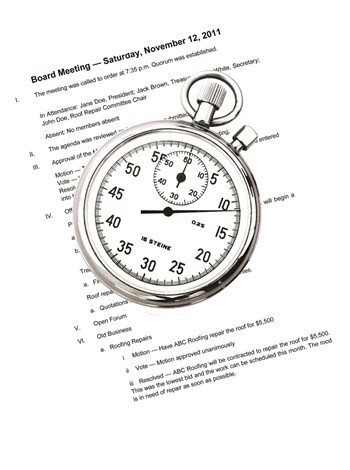
“Get it in writing,” is a time-honored axiom. For Florida condominium associations, cooperatives and homeowners’ association it is more than advice, it is the law. A primary responsibility of all association boards is to hold regular, advertised and accessible meetings for community association residents. Additionally there must be a written record of the meetings and those records must also be readily accessible for no less than seven years.
Go By the Book
Florida Statutes 720.303 (3), explains Ben Solomon, Esq., a senior partner at the law firm Association Law Group, PL, in Miami, spells out how minutes must be kept and maintained.
“Minutes of all meetings of the members of an association and of the board of directors of an association must be maintained in written form or in another form that can be converted into written form within a reasonable time,” the statute says. “A vote or abstention from voting on each matter voted upon for each director present at a board meeting must be recorded in the minutes.”
The next section of Florida statutes 720.303 (4) (f) also requires that associations maintain the minutes of all meetings of board directors and members “for at least 7 years.” The minutes are considered the “official records” of the association. Similarly, Florida Statutes Chapter 718 governs condominium associations, and contains similar provisions requiring minutes to be maintained for a period of seven years, Solomon says.
An Official Record
“An association is a business and must take meeting minutes to preserve the record of business of the association,” states Jane F. Bolin, Esq., a managing partner with the law firm of PeytonBolin, PL, in Fort Lauderdale. She adds that generally it is the association secretary who is assigned the task of minute-taking.
Jacqueline C. Marzan, Esq., a senior attorney with the Jay Steven Levine Law Group in Boca Raton, agrees that minute-taking is generally part of a secretary’s function; however, that task may be delegated to another board member, says Solomon. The president and/or the board may choose to assign record-keeping duties. Quite often, property managers are called upon to take meeting minutes. Ultimately, though, experts say that the sole responsibility for maintaining accurate records of an association rests with the secretary.
While there is no official form for taking minutes, some general guidelines should be followed. Bolin’s advice is to follow the order of the action. “A succinct agenda with matters to be discussed will make minute-taking an easier process.”
Marzan suggests minutes should, “ reflect the place, date, and time a meeting was held, the chairperson at the meeting, whether a quorum was established, proof of notice of the meeting, discussion of new business and approval of prior meetings’ minutes.” Votes, abstentions and details of all board actions should be officially recorded.
Solomon further recommends adhering to industry standards and guidelines as determined by the board, and/or seeking recommendations by the association’s counsel or manager.
What Not to Do
Bolin offers a few tips for proper minute-taking. “The minutes should not be a transcription of all the comments, opinions, and discussions of a particular subject,” she says. “Rather, the minutes should state who motioned for a vote, who seconded that motion, and whether the vote passed or failed.” And anyone abstaining should be recorded, she adds.
Certain instances, says Marzan, require being more specific. “In condominiums, the law requires conflict of interest disclosures be included in the minutes where a contract being considered has a director having a financial interest.”
For example, says Bolin, why not have a set framework that provides for motions, second motions, and outcome. “It should also include start and end times, attendees, and notes for any new business that may arise.”
Marzan says that some associations have even gone so far as to videotape meetings to confirm minute details. That might help improve accuracy, Solomon says. Another helpful step is making notes on the agenda itself to avoid missing important points, and to stay organized.
Privileged Communications
Certain things should never be included in meeting minutes, asserts Solomon. “Any privileged discussions with the association’s counsel should not be memorialized or even discussed in an open forum,” Solomon says. “This is one of the exceptions to the Sunshine Law, which is that the board is permitted to meet with the association’s counsel to discuss litigation and/or other privileged matters outside the presence of the members, and such discussions do not need to be recorded in the minutes.”
But all other matters are open, and residents have full access to them, Bolin says. Until minutes are approved at a subsequent meeting, they should be marked “unapproved.” Once they are approved, the minutes should be marked “approved” with the date. The purpose of this review and approval process is to provide board members with an opportunity to go over the official record and make edits, changes or additions. If a change to the minutes is requested at a subsequent meeting, a motion is made and put forward in a vote. Should a change be approved, then the minutes should reflect the correction.
Bolin suggests the best practice to memorialize a change in the minutes is a strike-through of the corrected copy and an underline of the additions. This way preserves the records and also tracks the corrections. In the event, a confidential matter involving attorney-client privilege is recorded Bolin says it may be necessary to ask the association counsel “to redact the minutes” before submitting anything that is to become the official record of the association.
Marzan says that board members can request access to records provided a written request is made. Records must be provided within 5 working days after the board or its designee, i.e., a property manager, receives the request. Florida statute requires that homeowners and condominium associations provide access within 10 working days. Failure to comply could lead to a fine of up to $50 per day for up to 10 days, she notes.
What’s not available is any record protected by lawyer/client privilege; materials obtained in connection with the approval of the lease, sale, or transfer of a unit; and personnel records of association employees or management company employees. Employment agreements with association employees or management company employees, or records showing compensation are not considered personnel records.
Unit owner’s medical records are also not accessible, as well as personal identifying information such as emails, social security numbers, and drivers’ license numbers. Information pertaining to the association’s electronic security system or operating software system are also off limits. When in doubt, a board member should always consult with the association’s attorney, Marzan says.
“The board should be careful not to reveal any personal/private information of members (other than what is expressly permitted under the statute such as names, addresses, etc.) in open meetings,” Solomon says. Privileged information cannot be discussed in an open meeting or reflected in the minutes of the association, he says.
A Legal Record
Remember, minutes are official business records and, therefore, are admissible in court. Minutes reflect any corporate actions taken and whether the board acted correctly in certifying a recall or adopting a special assessment.
Given the legal ramifications of board minutes, it is extremely important to elect a competent secretary who can plan to attend most if not all meetings. The minutes will serve as a reminder of both finished and unfinished business and projects, what needs follow-up, and what actions were finalized. The minutes also serve to provide an institutional history for new board members and residents.
In many associations, the secretary also is responsible for notifying the membership about upcoming meetings and important agenda items requiring a vote. Any committee motions, recommendations, and resolutions will need to be recorded accurately, but not necessarily verbatim. Many secretaries find it helpful to summarize key items on the agenda, being careful to include all the points of controversy and discussion. It is the secretary’s responsibility to ask questions during the meeting to be sure the minutes will be clear. He or she should not wait until the meeting is adjourned to request clarifications.
Following the meeting, the secretary should prepare a draft of the minutes and submit the copy to the board for review and corrections. Once the draft is returned, the secretary can prepare the formal copy and send it to the membership within 3-4 days of the meeting. Once the board reviews the final corrected copy of the minutes and votes on its acceptance, it is deemed approved.
Anne Childers is a freelance writer and a frequent contributor to The South Florida Cooperator.






2 Comments
Leave a Comment